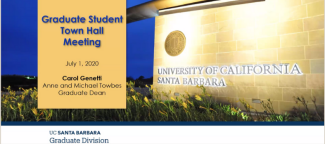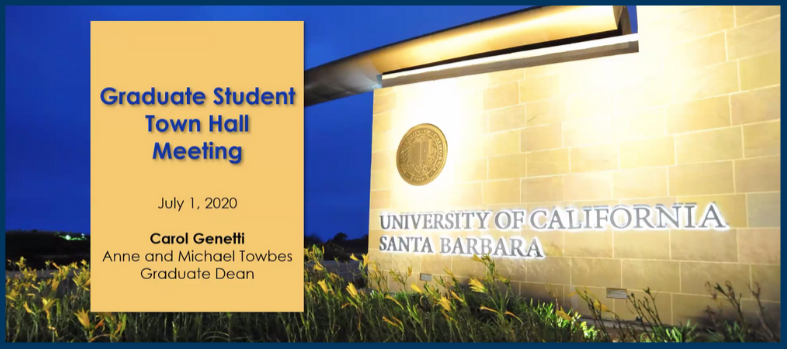Top Stories
Missed the recent graduate student town hall? Read on for a summary of the topics covered, including campus safety, research, Library services, curriculum, academic support, and more.


On July 1st, the Graduate Division hosted a town hall for graduate students about policies and resources on the UC Santa Barbara campus. The town hall featured the following speakers: Tim Sherwood, Associate Vice Chancellor for Research; Kristin Antelman, University Librarian; Tammy Afifi, Graduate Council Chair; Margaret Klawunn, Vice Chancellor for Student Affairs; Robert Hamm, Graduate Division Assistant Dean; Mary Hegarty, Graduate Division Associate Dean; Paige Digeser, Graduate Division Associate Dean, and Carol Genetti, Graduate Division Dean.
The presenters acknowledged that there have been myriad impacts on graduate students in the past few months and discussed what the next six months might look like. Read on for a summary of the presentation and discussion.
Campus Safety and Research in the Summer and Fall
- See the Office of Research's six-stage ramp-up plan for details about what activities will occur and when. More info is also here.
- We are now in STAGE 3: assessing the nature of research activities on campus. Some buildings have access (coordinated by building committees, deans, vice chancellors).
- One of the main challenges of this pandemic is that individuals may be asymptomatic while still having the virus. It is important to continue to wear face coverings on campus during this time.
- Campus cleaning crews have received training and protective gear.
Update from the UCSB Library
- During Stage 3, the UCSB Library is offering a paging and delivery service: students can select books through the library catalog and have them mailed to a physical address. Students can also search digital books through the HathiTrust Digital Library.
- In Stage 4, the Library will open up the paging service to all University affiliates. The building may also be open to access non-circulating items and other special research items.
- Currently Interlibrary borrowing depends on other libraries' reopening status. UCLA, which manages many of the collections, is not open. The Library hopes Interlibrary loans will be available in early fall, but this depends upon many factors.
- Beginning in Fall Quarter, students will have access to study spaces and printing services. Only the first two floors will be open.
- See the Library's FAQ page for more details.
Fall Graduate and Undergraduate Curriculum
- The campus is currently undertaking multiple safety protocols in compliance with federal, state, and local government instructions. These include COVID-19 testing, monitoring individuals who test positive, contact tracing in collaboration with county officials, assessing air flow in buildings, enforcing physical distancing, requiring face coverings, and analyzing classroom size to accommodate physical distancing. Departments are working closely with campus administration to determine how to bring individuals back to campus and reopen buildings safely.
- A survey showed that departments plan to conduct 80% of graduate classes remotely. Some may offer hybrid classes or in-person classes that conform to physical distancing requirements. However, exact plans vary by department, so please contact your department with any questions.
- Individuals who need to attend class remotely due to personal considerations such as health, childcare, etc. should speak to their advisors and departments for support on how to remain off-campus in Fall.
- It is anticipated that 90% of undergraduate classes will be conducted remotely. Most TAs will also hold office hours remotely, but depending on your department there may be opportunities for TAs who feel comfortable doing so to hold in-person discussion sections.
- Students are encouraged to speak to their department chairs about all of the above. If you have any issues with departments not respecting your personal safety choices, you are welcome to contact the Graduate Division.
Academic and Employment Policies
- New graduate students can defer admission for up to three quarters and will be able to defer their financial package as well. International students can also start their programs from their home countries. However, decisions are made by individual departments and it is therefore important to be in contact with your department to understand their specific approach during this time.
- All incoming graduate students are guaranteed housing for one year if they begin residence in the fall. A negative COVID-19 test may be required--this is still being determined. Students who defer until Winter/Spring quarter are not guaranteed housing, but will be accommodated as possible.
- The Graduate Division has extended TTD up to three quarters for all students. They anticipate most students will not need this extension, but it may be helpful if you faced delays in data collection, etc. Please contact your department if you think you may need this extension.
- The extended TTD may affect individual departments' admission policies, but this varies by department. Contact your department chair for details.
- The Graduate Division has also extended the ASE employment eligibility to up to 21 quarters for students who matriculate in the Spring and Fall quarters only. This allows students to seek employment for additional quarters if needed. However, students still need to submit an extension request to the Graduate Division to qualify.
- Please contact OISS for questions about visas.
Other Resources Available During This Time
- The Basic Needs Center, AS Food Bank, and Financial Crisis Response Team are open and available to students who need them.
- The CARE office is serving students through telehealth.
- The Children's Centers will tentatively reopen on July 27 (presuming no changes in the State/local community policies).
- Counseling and Psychological Services (CAPS) has appointments available--book here. You can also check their website for other services such as contacting social workers and links to mental health resources.
- OISS is open and available to students. International graduate students are welcome to call or email with any questions.
- Student Health is open for in-person and telehealth visits. COVID-19 testing is also available on site.
- Health and Wellness summer programs for graduate students will be announced soon. The Recreation Department is also offering suggestions for physical activities, as well as e-sports and virtual hiking.
Other Financial Questions
- Tuition and fees are determined on a UC-wide basis and are set regardless of method of instruction. They will not be refunded due to remote instruction.
- The Graduate Division cannot advise on tax status for international students, as each country's laws are different. You will need to conduct your own research on your country's tax laws.
- Money from the CARES act went out to domestic students who were eligible. Some students were also eligible to receive funding for technology for remote work through supplementary relief grants. The Financial Crisis Response Team is also available to help match students with available financial resources.
We hope this information was helpful to you!